Tea culture blooms in Cambridge and London universities: A taste of China, a bridge to the world
Tea culture often embodies the unique lifestyles and spiritual pursuits of different nations and regions. Serving as a remarkable bridge between China and the UK, it fosters intercultural dialogue and mutual appreciation. Events such as the "Tea and Qin Music Yaji" at SOAS, University of London, and the "Cambridge Garden Tea Gathering" at King's College, Cambridge, showcased the rich heritage of Chinese tea culture alongside guqin music, poetry, and visual arts.
These gatherings brought together scholars, musicians, tea masters, and enthusiasts from diverse backgrounds, offering attendees a deeply immersive experience in Chinese traditions while highlighting the universal appeal of tea. At the "Tea and Qin Music Yaji," a special event of the 2024 London International Chinese Music Festival, Dr. Yu Cheng, a renowned pipa and guqin player, collaborated with tea master Hong Yiyuan to craft a unique and captivating experience.
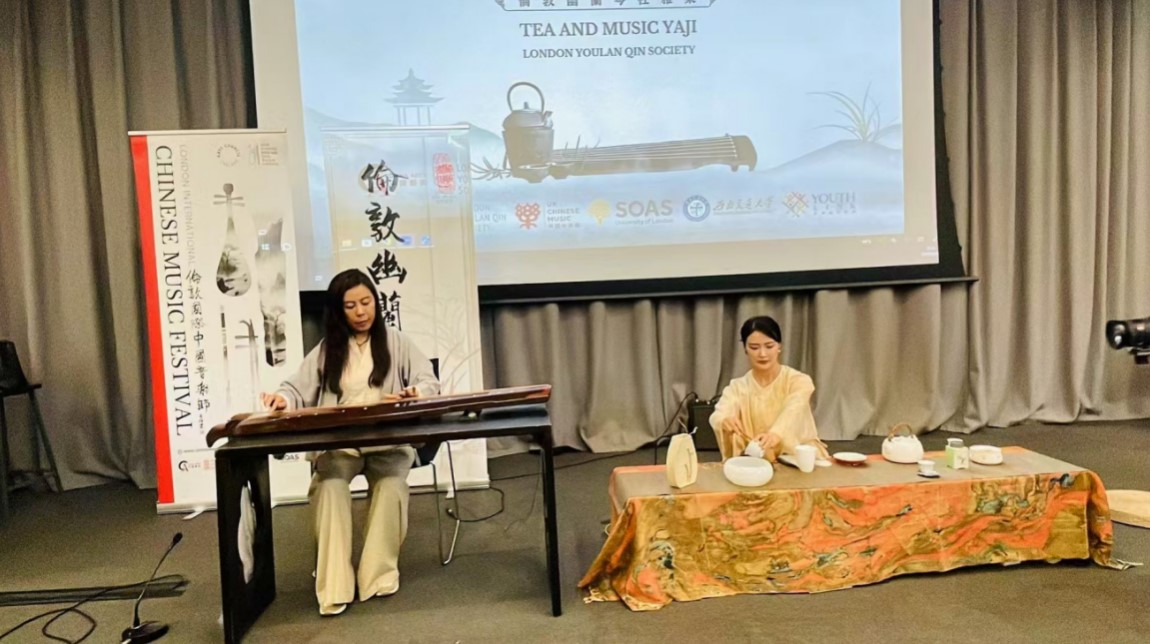
2024 Tea and Qin Music Yaji (Photo/Liu Wenfei)
The tenth anniversary of the Cambridge Xu Zhimo Poetry & Arts Festival took place at King's College, Cambridge, and opened with a Chinese tea ceremony alongside an art exhibition entitled "Love and Imagination: Courtyards and Wilderness". Against the backdrop of the Victorian garden filled with exotic blooms, Peter Cavaciuti, an Italian-born East Asian painter and tea master residing in Cambridge, and his student Xi Zi, demonstrated the techniques of Chinese Song dynasty matcha. Additionally, Sophie Song, a psychologist and tea master, showcased the brewing techniques of green and red teas, fully illustrating tea's ability to connect people across disciplines and geographies. Alan Macfarlane, chairman of the festival, fellow of the British Academy, and professor of Archaeology and Anthropology at Cambridge, also emphasized tea's transformative impact on global history and culture.
By blending traditional tea ceremonies with music, art, and poetry in iconic British settings, these events underscored tea's enduring role as a cultural ambassador, uniting East and West in a shared appreciation of heritage and harmony.
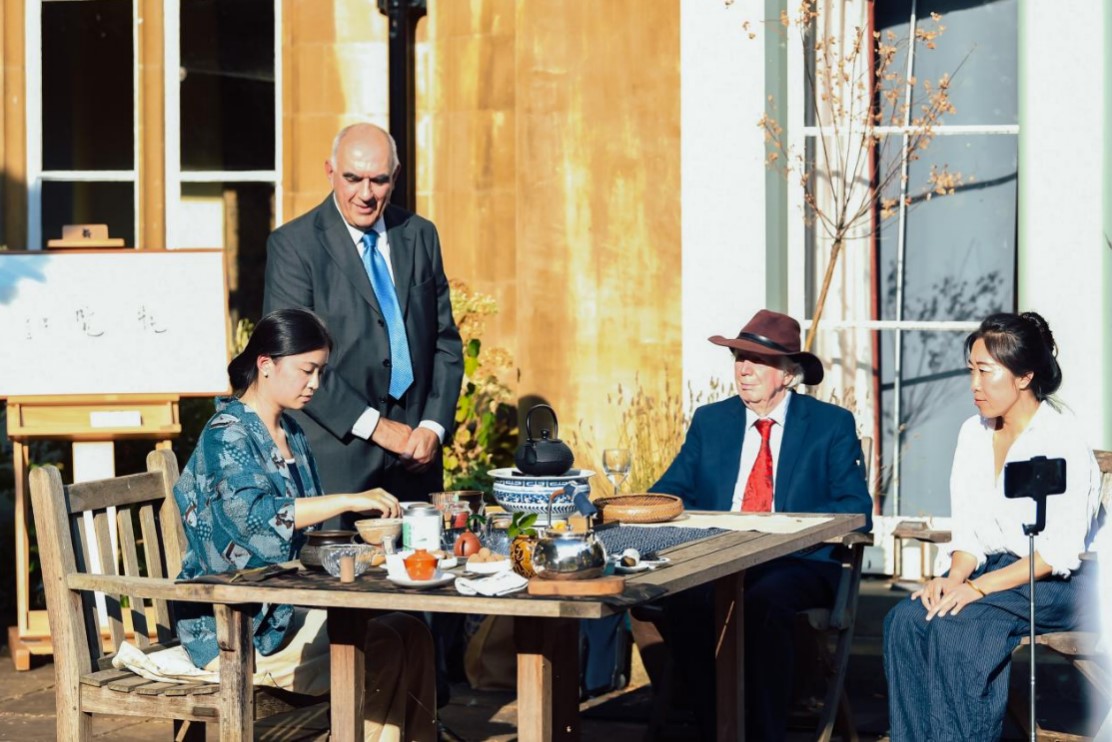
Peter Cavaciuti and his student Xi Zi prepare Song dynasty matcha. (Photo/Shen Yingqi)
Professor Alan Macfarlane: Green gold—a cultural ambassador linking China and the UK
Professor Alan Macfarlane views tea as more precious than gold. In his book "Green Gold: The Empire of Tea", he discusses tea's profound influence on global history, trade, and culture. He highlights that tea has impacted human civilization perhaps more than any other plant in history. The tea leaf contains over 500 different chemicals, with only two or three hundred understood to date. Among them is tannin, a phenolic compound with potent antibacterial properties. Macfarlane explains how the spread of tea to Britain dramatically reduced mortality rates, indirectly paving the way for the Industrial Revolution. While tea didn't cause the revolution, it created conditions that made it possible—without which, he notes, "we wouldn't be here."
These tea events and the Xu Zhimo festivals have also fostered deep cultural connections for him. Over the last two decades, his friendships with Chinese visitors, who often gifted him tea, have significantly enriched his understanding of China. He considers these exchanges a transformative part of his life.
The garden at King's College, with its traditional English charm, climbing plants, and apple trees, evokes the whimsical atmosphere of "Alice in Wonderland". Hosting tea events in such a setting enhances the experience, adding a layer of magic. Macfarlane reflects on how tea has always promoted cultural exchange and mutual understanding, emphasizing that it remains a peaceful, unifying drink.
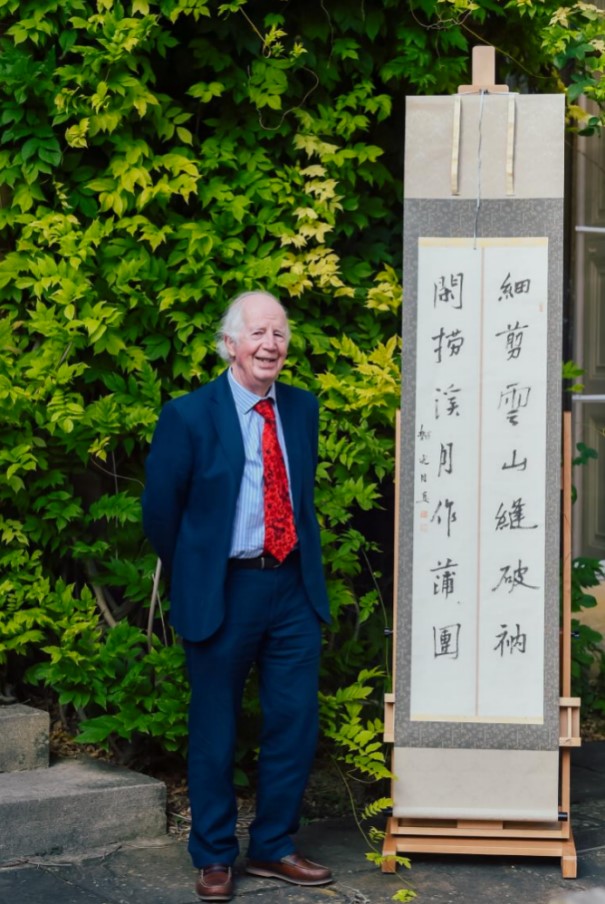
Alan Macfarlane (Photo/Shen Yingqi)
Peter Cavaciuti: The global appeal of Chinese tea culture and Asian traditions
When Peter Cavaciuti taught tea in Cambridge, his students came from diverse backgrounds worldwide. During tea events, he would place poetry or scrolls in the alcove, often featuring inscriptions from the Tang dynasty. These reflected the concept of "Yi qi yi hui", meaning "the only chance in one's life".
Cavaciuti sees Cambridge as a truly special place, attracting people not only for tea but also for a deeper understanding of Asian culture. Many attendees already have interests in Buddhism, philosophy, or experiences in the Far East, while others come out of curiosity, eager to explore further. He hopes to inspire more people in Cambridge to cultivate an interest in tea and use it as a medium to deepen their appreciation of Asian culture.
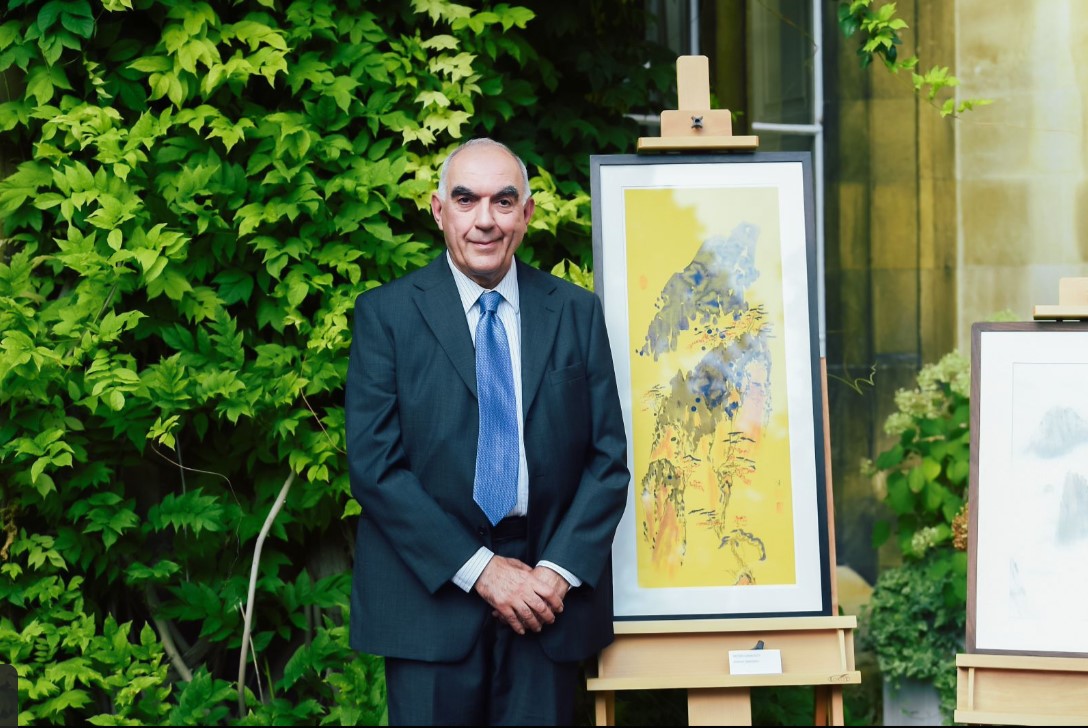
Peter Cavaciuti (Photo/Shen Yingqi)
Sophie Song: The harmonious fusion of Chinese tea with Eastern and Western arts
Sophie Song aimed to integrate the tea ceremony into the realms of music, art, and poetry. While these are different formats, she believes they share the same philosophy. Sitting in the garden during the ceremony highlighted the idea that humans have always been, and continue to be, part of nature. Tea ceremonies serve as a reminder of how we rely on nature, make use of its gifts, and ultimately return to it.
With extensive experience in hosting tea ceremonies in the UK, Song remarked, "Cities like Cambridge and London are international hubs, rich in diverse tea traditions, cultures, and people from all over the world. We organized several tea tasting sessions and ceremonies, and the enthusiasm from people worldwide was remarkable. They were eager to learn how to brew and drink tea, but these events also became opportunities for exchanging ideas, embracing each other's cultures, and appreciating our differences."
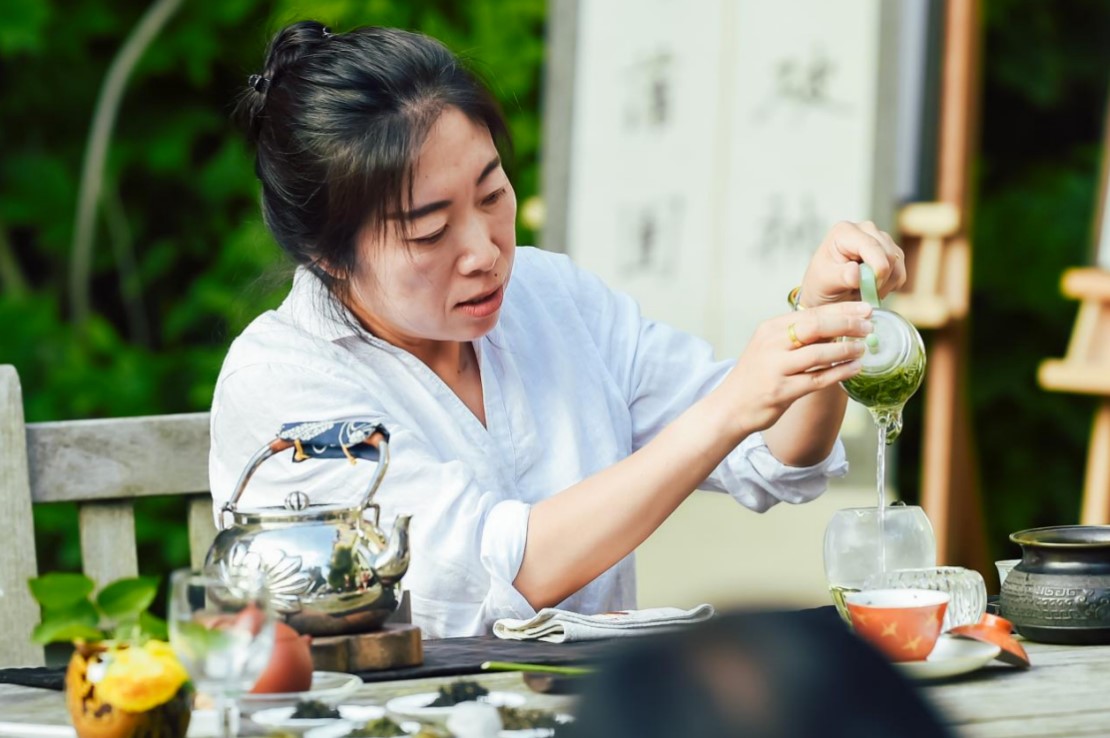
Sophie Song brews green tea (Photo/Shen Yingqi)
The "Tea and Qin Music Yaji" event was organized by China Arts UK, the London Youlan Qin Society, and UK Chinese Music, with co-sponsorship from institutions such as SOAS, University of London, Goldsmiths, University of London and the YOUTH LINK project at Southwest Jiaotong University. The "Cambridge Garden Tea Gathering" was hosted by the Cambridge Asian Cultural Society, and the Cam Rivers Tea House, with support from institutions such as the Cambridge Chinese Community Centre and School, the Zall Bookstore, MUYE Studio, Fuquan Tea House, Kara Cao Tea Collection, Chu Tea, and the YOUTH LINK project at Southwest Jiaotong University.

 Scan the QR Code
Scan the QR Code